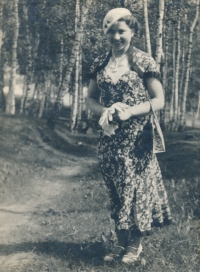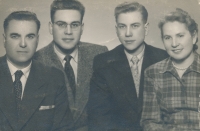Actors are like children sometimes
Download image
Oldřich Vlček was born on 18 May 1939 in Zlín. He grew up in nearby Kroměříž. His father Josef Vlček was imprisoned for 18 months in 1951 without any explanation. After “cleaning” his cadre profile with a year of work in a factory, the witness graduated from the Janáček Academy of Performing Arts (JAMU) in Brno. He served his military service in the Army Art Ensemble (AUS) in Prague. After spending two seasons in a theatre in Olomouc, he became a permanent member of the National Theatre company. In 1968, he became involved in activities against the Soviet occupation and during the subsequent normalisation purges he refused to approve of the entry of Warsaw Pact troops into Czechoslovakia as international aid. He continued to be an employee of the National Theatre, but without much opportunity to work there as an actor. He was an actor at the National Theatre for 50 years, and now he is working at the Jan Kaška Theatre in Zbraslav. At the time of recording (2023) he was living in Prague-Zbraslav.


